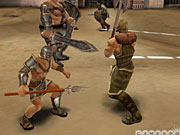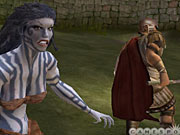Gladius Updated Preview
We try out a near-final version of LucasArts' upcoming strategy RPG.
We've been following Gladius since LucasArts showed off the game in May 2002. The internally-developed product is an ambitious role-playing game that covers the hallowed ground once exclusively owned by Japanese developers, such as SquareSoft (now Square Enix). LucasArts manages to offer a pleasant surprise. We logged in some time with a near-final version of the game and are pleased to report that Gladius is shaping up to be a fine, original RPG that fans will want to keep an eye out for.

Gladius features two individual stories that intertwine to tell one epic saga. You play as either Ursula, the daughter of a barbarian king from the northern land of Nordagh, or Valens, the son of one of the greatest gladiators from the land of Imperia. At the start of the game you choose which of the pair you want to play and then go through the entire game from his or her perspective. As you make your way through your respective character's story, you interact with the character you didn't pick as he or she goes about his or her business. The dual narrative ends up serving two main purposes. First, it offers a broader scope to the story. Second, and most importantly, each character's tale offers a set level of difficulty. Ursula's story is the easier of the two and is a good place for beginners to start, while Valens' adventure is better suited for advanced players. The setup actually works pretty well. You obviously want to play through the game at least twice, anyway, to get the whole story. The greater challenge keeps the game experience fresh on your second pass, and it tests the combat skills you learned while playing the game as Ursula.
The basic structure of Gladius offers a mix of linear and open-ended gameplay. As with every RPG, the game features a distinct linear path that you follow from start to finish. The main story in the game follows Valens and Ursula as they set out to build up their gladiator school and keep the world from a war that could spell the end of everything. However, you'll also find a plethora of side quests as you go through the main story. Thankfully, the impending apocalyptic war isn't on a tight timeline, which allows you to take your time on your adventures. The side quests end up being quite beneficial thanks to the experience and special items you earn from them.

The gameplay mechanics in Gladius draw on elements from traditional console RPG and tactics games to offer an engaging experience. The time you spend exploring the world and interacting with characters in the various towns you journey to is right out of any console RPG made in the last decade or so. You talk to locals for information on current events, stock your team of gladiators by dropping gold in shops, and engage in battles to earn items you need to progress. Party management and combat offers the same range of options you find in most any tactics-style game. You can recruit new members to your school by interacting with them or just throwing gold at any gun-for-hire you find in your travels.
As far as combat goes, the turn-based battles are firmly rooted in the tactics genre, although there are a few tweaks to keep you engaged. You pull together a team of fighters from your school based on whatever configurations are required by the battle. The nice touch about combat is the implementation of a "swing meter" which ensures you'll be doing more than reading a book and zipping through combat menu options with one button press--as is sometimes the case in RPGs. When you initiate combat, the meter comes up--if you manage to press the A button at the right time--and, the more the cursor travels across the meter, the more damage you inflict. As with most tactics games, you have to carefully position your fighters during combat, making use of terrain--if you can--to give yourself the best advantage possible.
While the core combat mechanics are pretty basic, Gladius does offer a ton of depth to exploit once your characters start leveling up in the game. You can basically customize every fighter you have--in any way you like--by spending job points earned as you level up to buy new skills. There are a staggering amount of ways you can tweak your players--via their abilities or weapons (which can have elemental affinities)--which makes for plenty of replay value for gamers eager to try new configurations. We could easily write another thousand words on everything the game offers, but, suffice it to say, if you like detailed party management, Gladius has plenty to offer. However, that's not to say the game is going to be asking you to perform complicated math problems. Basically, the depth is there if you want to explore it. Though, if you're more interested in battling, you don't have to spend a ton of time managing your party, as the game is pretty good at helping you with default offerings as you play.

The graphics have come together quite nicely and offer a rich presentation that's both technically and artistically impressive. The character models you see in the game's cutscenes and battles are large and feature a generous polygon budget. You'll find an impressive variety in models, thanks to the broad range of fighters in the game. Everything from humanoid to animal combatants are highly detailed and animate nicely. The environments in the game offer the same level of detail--with a nice variety of locales. Action is set all over the game world, and there are even distinctly different weather patterns. The areas are complemented by some slick lighting effects and small details, like cheering crowds. However, as impressive as the core graphics are, there are a host of little touches to appreciate in the game. The game's world map uses a rich, detailed 3D presentation you can explore on foot. It's comparable to some third-person action games. Our favorite element has to be the abundance of carefully crafted 2D art used for story sequences. While you see a healthy amount of cutscenes--that all rely on the game engine--Gladius also makes use of 2D art to tell its story. The richly detailed art is gorgeous, and it's enhanced by subtle effects, like rain and slight warping as the voice-over unfolds. Speaking as to how the game fairs on all consoles, GameCube, PlayStation 2, and Xbox owners should be equally pleased. The development has worked to ensure Gladius makes the best use of each platform. The graphics are comparable, across the board, and move along at a steady clip. You'll notice some differences in fine details, like texture resolution and color. The Xbox and GameCube versions do look a bit nicer, but overall the game is solid across all three systems.
The audio in the game is strong and immersive. Ambient details are plentiful and do a fine job of setting the tone during battles. You're cheered on by crowds and hear the satisfying clang of weapons as you fight. Combatants fire off soundbytes as they battle, often punctuating particularly good or bad attacks. The game's score is suitably sweeping and frames the action quite nicely. The voice acting is strong, thanks to a broad assortment of voices. Valens and Ursula benefit from a bit of star power, thanks to the respective voices of Michael Rosenbaum, of Smallville, and Linda Cardellini, of Scooby-Doo.

From what we've played, Gladius appears to be shaping up quite nicely across all three platforms. The game looks good, plays well, and features an impressive amount of depth for players to discover. The development team has taken extra time--afforded by a shift in the release date--to polish up the game's presentation and to tighten its gameplay. The end result should appeal to fans of RPGs and tactics games alike. While the game is a strong title across all platforms, its release should be especially welcome for Xbox and GameCube owners, as both platforms are a bit thin in the RPG genre. PlayStation 2 owners, obviously a bit spoiled by the system's broader offering of RPGs and tactics games, will find that Gladius is a strong addition to the PlayStation 2 lineup, and it compares favorably to what's already out for the system. Anyone looking for a cool, original game will want to keep an eye out for Gladius when it ships later this month for the GameCube, PlayStation 2, and Xbox.
Got a news tip or want to contact us directly? Email news@gamespot.com
Join the conversation